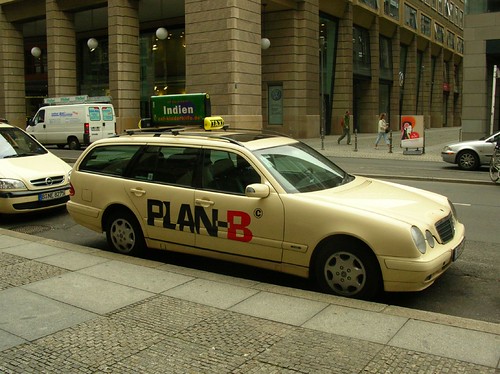Tuesday, July 10, 2007
Plan B

On the morning of Tuesday, July 3, B and I reached our neighborhood S-Bahn station to take the train to the airport. We had a plan to reach Schonefeld Airport 2 hours and 16 minutes before our international flight, fitting each piece together like a Swiss watch.
6:15 – wake up (alarm)Even if we were to miss the 7:19, another Schonefeld train would be along at 7:39, and we’d still be almost two hours early. We were so confident in our planning that, B, who is usually quite the Germanic task master on travel timetable issues, proposed an unscheduled stop at Coffeemama’s which would, I calculated, have made it tight even to catch the 7:39.
6:45 – leave apartment
6:50 – stop at bakery
6:55 – walk to S-Bahn station (20 min)
7:15 – arrive S-Bahn station
7:19 – board train for Schonefeld
7:59 – arrive Schonefeld
I was the nervous one this morning, so I vetoed Coffeemama’s and when I saw the train sitting inside the station, I started to move fast. But when we reached the platform, the train was obviously lifeless and going nowhere.
One of the more disconcerting moments in foreign travel is when you waiting for, or riding on, a public conveyance of some sort and you hear an untranslated announcement in a language you don’t understand. You don’t know whether they’re saying, “the train for [your destination] has been relocated to track 5,” or “the train for [someone else’s destination] has been relocated to track 5,” or “Please calmly exit the station, there is a bomb threat.” Instead, you simply hear “blah blah blah Schonefeld blah blah five.” Or “please blah blah blah.” And the people standing around with you collectively heave a sigh and slouch toward the exit, and you follow like a lemming. Or worse, half the people around you sigh and slouch toward the exit, and you have to decide whether you’re group is the leavers or the stayers.
But this particular morning, the train platform was sparsely peopled, so when the situation was explained by the incomprehensible (to me) announcement over the PA system, it was impossible to infer what it said from the other passengers’ movements. A telltale, 3-word phrase flashed on the “next train” signs over the platform, so I got out my Langenscheidt Pocket German Dictionary and painstakingly translated:
Please ... listen for ... announcementWith insipient not-quite panic beginning to form in the bottom of my stomach like the first signs of nausea, I tracked down a station agent having coffee in the breakroom, and said, “Keine bahn?” by which I meant something like “no train?” She replied in German, and I was pretty sure she was telling me that the S-Bahn (the elevated train) was not running, but the U-Bahn (underground) was.
A host of questions presented themselves. Was the S-Bahn stopped only on certain lines – in central Berlin perhaps – so that we could catch it elsewhere, or was the entire S-Bahn down... and for how long? Did the U-Bahn go out to Schonefeld? And, with the U-Bahn functioning more like a local compared to the S-Bahn’s express, how long would it take?
Or should we just try to catch a taxi? Our neighborhood is not a good one for spontaneous taxi-hailing. The “plan B” that hastily materialized as we double-timed it, bumping our rolling suitcase over cobblestones, was to try the front entrance to the local hotel, and if that were to fail (which it did), to hustle to the U-Bahn. Not to make it all the way to Schonefeld, but rather to catch a taxi in front of Zoologisher Bahnhof, one of the larger Berlin train stations.
Not a perfect plan. B and I had visions of a New York City commuter rail shutdown, where every commuting soul in the tri-state area would naturally get in his or her car and jam the hell out of the already bumber-to-bumper highway traffic into the city. And in Berlin, which has no centralized downtown, we’d get LA style traffic – stop and go in all directions. That is if we could even find a cab – thinking again of New York, where available taxis become scarce during any rainstorm or transportation hiccup.
But there were several taxis waiting in front of the train station. And our super-mellow driver, a distinguished-looking man in his late 50s whose radio (and life, it seemed) was tuned to light jazz, got us to the airport in 45 minutes despite never exceeding an unhurried 50 m.p.h. This wasn’t due to traffic – there was no traffic. 8:15 a.m. in a major city during a transit shutdown, and the traffic was as light as 11 p.m. in LA.
The driver told us that there was a railroad strike affecting the intercity and S-Bahn trains. And of course there’d be no extra traffic, because people could still take the U-Bahn or buses. And because, in Germany, if a rail strike makes it too difficult to get into work, that counts as a valid excuse to stay home for the day.
What bothered me most was feeling so out of touch that I didn’t even know the long-announced strike was going to happen. The German word for “strike” is “streik,” and had I simply glanced at the Berliner Zeitung and seen “Bahn” and “Streik” in the same headline, I’d have had the sense to ask around.
Subscribe to Comments [Atom]
